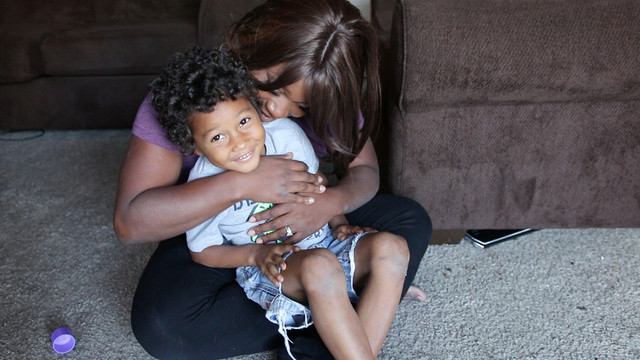One of those families is Jazzmon Wilson and her son Timothy. I recently met with them at their home in Rancho Cordova, outside of Sacramento. Timothy was playing a video game.
For most families, it was a familiar scene, the 6-year-old glued to his Super Mario game, leaping and dodging virtual pitfalls. But his mom, Jazzmon, still couldn't quite believe what she was seeing.
"It's amazing, he's 6 now, and I never thought this was going to happen," she said, "but he plays Mario. He can play it!"
The fact that Timothy can understand how the video game works, and interact with it -- let alone sit still long enough to figure anything out in the game -- is a major accomplishment, she said.
"He's doing things other kids can do, too," she said. "And it's those little moments, it makes you just so grateful."
It wasn't always this way. Timothy has autism, and his mom described it as having a brain that was wired a little differently. She compared it to one of those frustrating cell phone conversations where there's a couple of seconds delay and people can't communicate with each other. She says her son Timothy had an 8-second delay.
And that's not all. At two-years-old he couldn't speak a single word. Not mama, not Dada, nothing. He would spin around. He would yell, constantly.
But once he started ABA therapy, his mom says, he was a different kid.
"ABA is giving back to you the typical experiences you dreamed you were going to have when your kid was born," Wilson said said. "All those LITTLE things."
Little things like sitting still, or making eye contact with his mother.
The basic idea of ABA therapy is to rewire all the little steps most people take for granted. For example, an ABA therapist will reward a child for sitting down with so-called "quiet hands" for two seconds. Then a reward for five seconds, then 10, and so on.
After all of that, said Gregory Buch -- a behavorial psychologist in Roseville, north of Sacramento -- comes the arduous process of actually learning words.
"The challenge is, if you have a child who is 3-years-old and has no language whatsoever, you've got about two years' of communications skills at least to teach them," Buch said.
"So not only do they have to learn everything that an average child learns that they didn't learn," he said, "they have to learn it faster than the average child learned it."
When you combine a slow learning process with starting out way behind, you need an intensive program to catch up, Buch said. But, he added, that's what works.
"I think most kids [with autism] will benefit from some kind of ABA intervention," he said. "And for some kids, that's a really dramatic gain."
This type of therapy has been a clinical standard of care for more than a decade, but that doesn't always mean people could access it.
The Legislature had to order private insurance companies two years ago to pay for it. But with Medi-Cal, coverage remained blocked. Until now.
"We are extremely pleased and excited that we're adding this benefit," said Toby Douglas, director of the state Department of Health Care Services.
Douglas said California is first in the nation to act on new federal rules on autism care. California was just waiting for the federal go-ahead, he said.
"It has been something that stakeholders [and] the state have been exploring for a long time," Douglas said.
Earlier this month, hundreds of stakeholders gathered in a Sacramento auditorium to hash out the devilish details of implementing the benefit.
Kristin Jacobson, president of Autism Deserves Equal Coverage, was at that meeting, and she says there are still miles to go before everyone eligible for therapy gets the therapy.
"This has been a really, really long struggle. We've been fighting for such a long time. We're encouraged, but we are going to remain very vigilant," she said.
"If Medi-Cal doesn't make sure to contract with the vast majority of current existing providers, they will not have enough providers," Jacobson said. "They will not be able to actually provide the benefit that they're saying."
However, she said, the bottom line is: After years of telling her autism clients "No, no, no, no," now she's finally able to say "Yes," Jacobson said. Her organization has produced a fact sheet to answer questions about the new benefit.
Jazzmon Wilson, back in her living room with Timothy, said the state's coverage couldn't have come at a better time. Timothy had a short course of therapy paid with proceeds from a legal settlement, but that's about to run out. Without the new Medi-Cal benefit, she said she didn't know what she would have done.
"To have something that can bring a little bit of hope, it makes all the difference in the world," Wilson said. "And so when he can do those things now, it makes … It makes life worth living, which is hard to say. It really is hard to say that."
The state still has plenty of work to do, as it hasn't yet set provider rates or eligibility standards. But for thousands of families across California, the coverage for ABA therapy may mean a taste of fresh hope in their lives.
